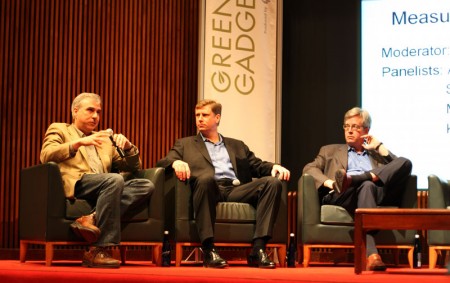This panel was moderated by Adam Aston, the Businessweek Energy and Environment editor . The panelists were Ken Rother (President and COO of Treehugger), Michael Murphy (Senior Manager of Environmental Affairs at Dell), Stephen Harper (Director of Environment and Energy Policy at Intel Corp) and Aaron Dallek (Co-founder and CTO of Planet Metrics). We will list some key points, and our questions here.
Businessweek To Intel: How does your company do internal/external green?
Intel: Intel is the largest purchaser of green energy in the world. We just don’t market it.
Treehugger: where do components fit into larger lifespan of product?
Metrics: a carbon footprint is not standardized today- not trackable.
Dell: We have an EP Certification. Which is becoming a standard for electronics.
Intel: EP and Energy Star are ignored by fed.
Intel: We (everyone) should put a “price of carbon” label on goods.
Businessweek: Changing liquid products to powder is a huge game changer. Gives props to Samuel Griffith.
Intel: Discusses how intel had to go lead free. Spent 200 million to do so.
Businessweek: TESCO did a full carbon count on products in store.
If you google EP certification, you don’t get anything concrete to click on. After further research, you get organizations like IPEP, NAEP, ABCEP, and E2. These all offer their own version of certification and information. The problem here is that nothing is standardized across the board; so it means zero to the average consumer. Dell is actually taking the right steps towards sustainability in the company (more info here), but unless the industry standardizes the carbon footprint, it becomes more about corporate marketing and greenwashing. Products obviously need a standard like LEED is becoming for architects. But even LEED seems like another expensive certification.
MTFY Q: What steps do we need to take to standardize a Carbon Footprint on a global level? Should the government get involved? Is paying for a certification helping or hindering this process?
Dell: working with 1000+ components is a huge challenge.
Intel: making changes is not going to bankrupt a company. Engineers are by nature problem solvers. Marketing and competition will help in making a change.
Dell: we offer free recycling. We take stuff back and refurb first.
Treehugger: products do need a really long life cycle; especially with current economic climate.
Dell: their computers use less energy now, then ever before.
Tags: carbon footprint, eco-designer, economy, gadget, green, LEEDMTFY Q:Â Is it more energy efficient to do an upgrade, or keep using the same product for a long period of time?





WHAT TO DO NOW?